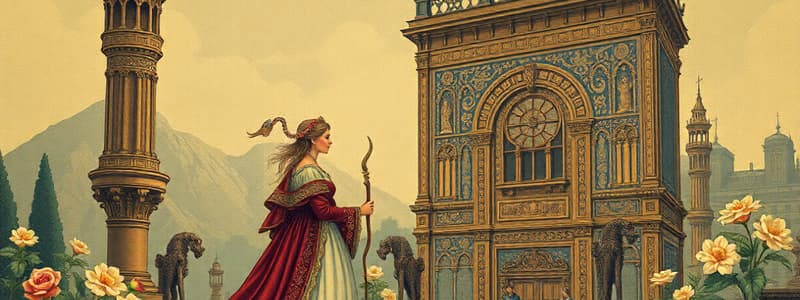Podcast
Questions and Answers
How do liberal theories propose to foster cooperation among states?
How do liberal theories propose to foster cooperation among states?
Through economic interdependence, the spread of democracy, and the establishment/support of international institutions.
What are the three fundamental principles of liberalism in international relations?
What are the three fundamental principles of liberalism in international relations?
Rejection of zero-sum power politics, emphasis on nonstate actors and international organizations, and emphasis on international cooperation.
In Kant's view, what are the two possible futures for humanity?
In Kant's view, what are the two possible futures for humanity?
The end of all hostilities through agreement, or perpetual peace of the cemetery of humankind after an annihilating war.
According to Kant, what role does international law play in achieving peace?
According to Kant, what role does international law play in achieving peace?
According to Kant, how does economic interdependence contribute to peace?
According to Kant, how does economic interdependence contribute to peace?
What was the main goal of Woodrow Wilson's 'Fourteen Points'?
What was the main goal of Woodrow Wilson's 'Fourteen Points'?
Name three specific proposals included in Woodrow Wilson's Fourteen points.
Name three specific proposals included in Woodrow Wilson's Fourteen points.
Name any three treaties, conferences, or proposals that arose from the Idealist Programme during the interwar period.
Name any three treaties, conferences, or proposals that arose from the Idealist Programme during the interwar period.
How did idealists believe increasing economic interdependence could prevent war?
How did idealists believe increasing economic interdependence could prevent war?
According to idealists, how can the spread of democracy contribute to international peace?
According to idealists, how can the spread of democracy contribute to international peace?
Name one of the two dimensions of interdependence outlined by Keohane and Nye.
Name one of the two dimensions of interdependence outlined by Keohane and Nye.
According to complex interdependence theory, how should international relations be viewed?
According to complex interdependence theory, how should international relations be viewed?
In contrast to realism, what is the liberal perspective on the primary actors in international affairs?
In contrast to realism, what is the liberal perspective on the primary actors in international affairs?
How do realist and liberal traditions differ on how order and stability are achieved in the international system?
How do realist and liberal traditions differ on how order and stability are achieved in the international system?
Flashcards
Liberalism vs. Realism
Liberalism vs. Realism
Liberalism dismisses power politics emphasized in realism, believing cooperation is pervasive.
Promoting Cooperation
Promoting Cooperation
Cooperation promoted through economic interdependence, democracy, and international institutions.
International Liberalism
International Liberalism
Rejects zero-sum power politics, emphasizing non-state actors and international cooperation.
Liberal Blueprint for Peace
Liberal Blueprint for Peace
Signup and view all the flashcards
Liberalism's Analytic Unit
Liberalism's Analytic Unit
Signup and view all the flashcards
Liberalism's Focus
Liberalism's Focus
Signup and view all the flashcards
Liberal view of the Individual
Liberal view of the Individual
Signup and view all the flashcards
Liberal view of the State
Liberal view of the State
Signup and view all the flashcards
Liberal view of the Int. System
Liberal view of the Int. System
Signup and view all the flashcards
Liberalism & Change
Liberalism & Change
Signup and view all the flashcards
Kant's Futures for Humanity
Kant's Futures for Humanity
Signup and view all the flashcards
Establishing Conduct Among States
Establishing Conduct Among States
Signup and view all the flashcards
Interational Peace-Pact
Interational Peace-Pact
Signup and view all the flashcards
Woodrow Wilson
Woodrow Wilson
Signup and view all the flashcards
Wilson's 14th Point
Wilson's 14th Point
Signup and view all the flashcards
Study Notes
Liberalism Overview
- Liberalism contrasts with realism by dismissing power politics principles.
- Cooperation is considered pervasive, with cooperation promoted via economic interdependence, democracy, and international institutions.
- Liberal theories adhere to core assumptions.
Fundamental Principles of Liberalism
- International Liberalism includes a rejection of zero-sum power politics.
- Emphasis on non-state actors and international organizations is a fundamental principle.
- Emphasis on international cooperation is also key.
Liberal Blueprint for Peace
- There is a cyclical relationship between international organizations, democracy, economic interdependence, and peace.
Core Assumptions of Liberalism
- Analytic units include states, international organizations, and non-governmental groups.
- Issues cover multiple agendas, with economic or social issues as or more important than national security.
- Individuals are basically good, and capable of cooperating with optimistic view of human nature.
- The state is not an autonomous actor, is disaggregated into components, some of which act transnationally.
- The international system involves interdependence between actors and is an international society.
- Change is seen as probable and desirable.
- Major theorists include Montesquieu, Kant, Wilson, Keohane, and Nye.
Immanuel Kant (1724-1804)
- Kant, an 18th-century German philosopher, wrote "Perpetual Peace" during the French Revolution.
- Kant believed there were two possible futures for humanity - the end of all hostilities through international agreements or the perpetual peace in a cemetery after an annihilating war.
- Kant accepted Hobbes’ view of state of nature and anarchy.
- Kant believed man was capable of evil depending on the circumstances.
- Kant argued changing circumstances could lessen the propensity for war.
- Kant looked at the world the way it could be, rather than how it is.
Perpetual Peace - Key Tenets
- Establish a system of conduct among states, including sovereignty, non-intervention, and disarmament.
- Convert authoritarian states into republican states because republics are "incapable of bellicosity."
- Establish an alliance of republican states to resolve disputes peacefully, which is an International Peace-Pact.
- International law based on reason should replace war as a way to mediate international disputes.
- Economic interdependence prevents war.
- Commerce cannot coexist with war, and will eventually take hold of every nation.
Woodrow Wilson (1856-1924)
- Wilson was a US President during WWI.
- Wilson was known as the father of the American Internationalism school.
Wilson's 14 Points for Peace
- Wilson addressed the US Congress, asking for a Declaration of War on 12 April 1917.
- The address was both a justification to fight Germany and a plan to end all war.
- The 14 points included open covenants of peace, openly arrived at.
- They also included freedom of navigation of international waters.
- Included the removal of all economic barriers and equality of trade conditions among all nations.
- National armaments were to be reduced to the lowest point for domestic safety.
- Impartial adjustment of all colonial claims, based upon a strict observance of the principle of self-determination was included.
- Russia was to be considered as part of the 14 points.
- Belgium, All French Territory and Alsace-Lorraine were included.
- Italy, Austria-Hungary Empire, Rumania, Serbia, and Montenegro were included in Wilson's points.
- The Ottoman Empire and Poland were part of the 14 points.
- A general association of nations should be formed under specific covenants guaranteeing political independence and territorial integrity to great and small states alike.
Innerwar Idealists (1919-1939)
- Emerged in response to the carnage of WWI.
- War is seen as not due to human nature but rather a political effect under certain conditions.
- International Relations was considered too important to be left to politicians or the monarchy.
- WWI emerged by accident and war occurred because leaders had no time or place to discuss the crisis.
Idealist Program
- Aims to build international confidence, encourage restraint, and foster cooperation.
- The program includes Woodrow Wilson's 14 points.
- Further components included the Versailles Peace Treaty (1919), the League of Nations (1919), Washington Naval Treaties (1921-22), and the Locarno Conference (1925).
Idealist Vision of Ending War
- Economic interdependence increases the cost of war for states.
- Increasing economic interdependence makes countries disinclined to cut profitable ties.
- The spread of democracy means questions of war and peace are no longer confined to elites.
- Leaders must consider public opinion and avoid international confrontation and hostilities.
- International law would contribute to the peaceful settlement of disputes.
- Western civilization has suffered enough from war and leaders/citizens have learned about the costs.
Complex Interdependence
- This concept was advanced through "Transnational Politics and World Politics" (1971) and "Power and Interdependence" (1977).
- Increase in transnational relations was real, historically specific, and marked a change at the international system level.
- Military capability is less important as a measure of state power.
- Constraints with regard to military force necessitated new thinking pertaining to statecraft, the meaning of power, and enhanced peace/security means.
- Economic issues were considered more important than security issues in international relations.
- Complex Interdependence does not mean equality.
- Interdependence involves sensitivity and vulnerability dimensions.
Complex Interdependence vs Realism
- Realism looks at foreign policy from the outside, while interdependence looks from within.
- Realism sees the state as a unitary, rational actor, whereas, Interdependence looks inside the "black box" to analyze how, and who makes decisions.
- From the outside, IR should be seen by realism as a "cobweb" with multiple actors and issues.
- Actors include executive, legislature, sub-national governments, public opinion, bureaucracy, business, and individual idiosyncrasies.
- State, IGOs, MNCs and NGOs can be actors from without.
- Issues from without include trade/investment, tourism, migration, environment, communications, terrorism, and nuclear weapons.
Studying That Suits You
Use AI to generate personalized quizzes and flashcards to suit your learning preferences.



